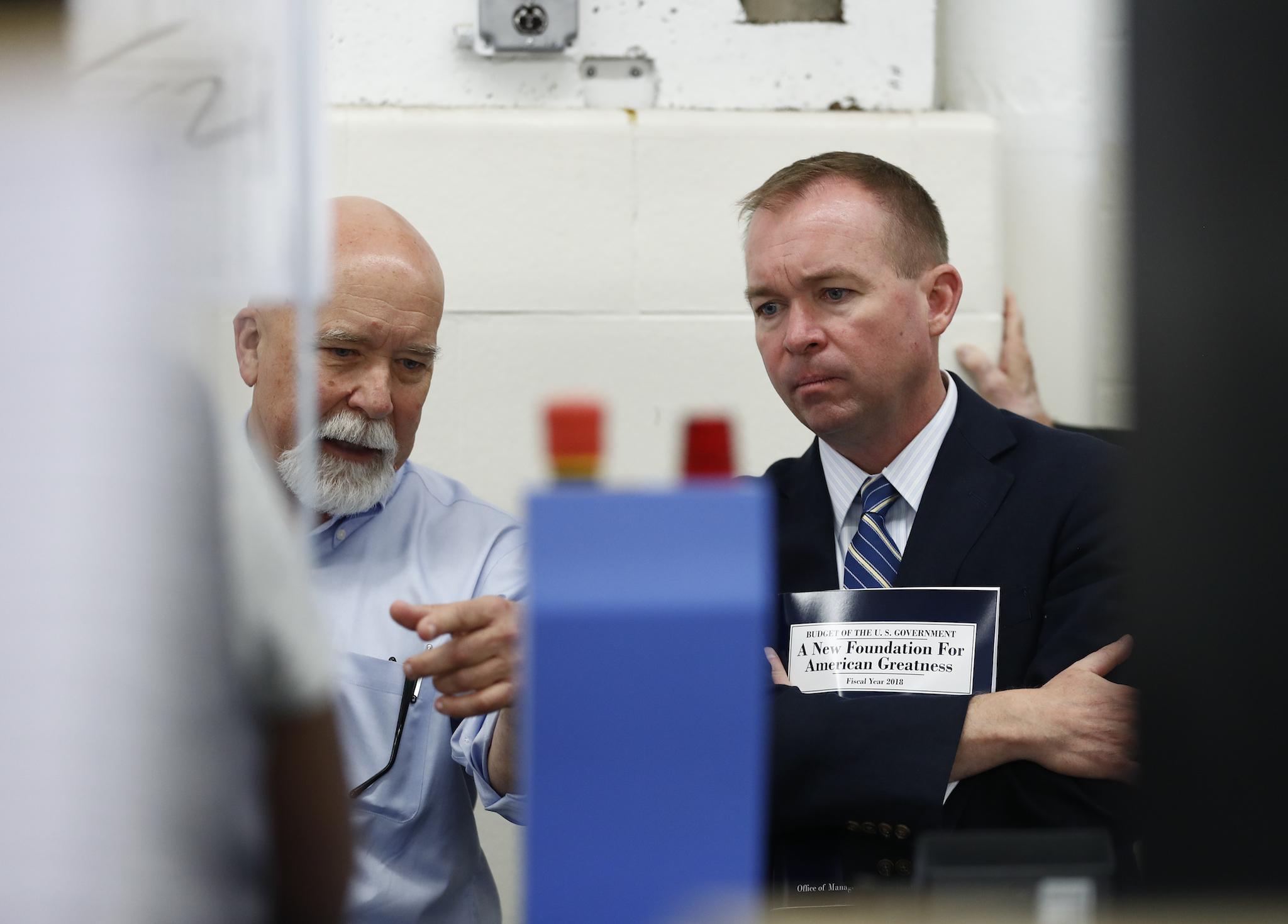Trump administration says it wants to wipe out US deficit in 10 years
The President's proposal to eliminate the budget deficit is similar to a strategy suggested by Theresa May in the UK

Your support helps us to tell the story
From reproductive rights to climate change to Big Tech, The Independent is on the ground when the story is developing. Whether it's investigating the financials of Elon Musk's pro-Trump PAC or producing our latest documentary, 'The A Word', which shines a light on the American women fighting for reproductive rights, we know how important it is to parse out the facts from the messaging.
At such a critical moment in US history, we need reporters on the ground. Your donation allows us to keep sending journalists to speak to both sides of the story.
The Independent is trusted by Americans across the entire political spectrum. And unlike many other quality news outlets, we choose not to lock Americans out of our reporting and analysis with paywalls. We believe quality journalism should be available to everyone, paid for by those who can afford it.
Your support makes all the difference.Donald Trump is hoping to wipe out the US’s more than $350 billion budget deficit over the next decade by cutting spending on social safety-net programmes by more than $1 trillion.
During a briefing, Mr Trump’s Budget Director Mick Mulvaney said the President’s first major budget proposal – titled “A New Foundation for American Greatness” – will balance in 10 years, and will begin “to reduce the deficit as a percentage of the overall economy” starting in 2018.
A 'deficit' means that a government’s tax revenues exceed its expenses. It is the opposite of a surplus.
This is the first time “in a long time in which an administration has written a budget through the eyes of the people who are actually paying the taxes,” Mr Mulvaney said, later adding, “I think what ‘Trumpnomics’ is, and what this budget is a part of, is an effort to get to sustained 3 per cent economic growth in this country again.”
While not including cuts to Medicare and Social Security retirement benefits, Mr Trump’s proposals would slash government spending by $3.6trillion over 10 years, hugely scaling back Medicaid – the state-federal programme that provides healthcare to low-income citizens – food assistance and other anti-poverty programmes.
Millions of people would be pushed off of food stamps, and funding for the Children’s Health Insurance Program (CHIP), which benefits poor families, would be decreased by 20 per cent.
The budget contraction reflects Mr Trump's perception that too much of taxpayers' money is being wasted.
“We are no longer going to measure compassion by the number of programmes [the government funds] or the number of people on those programmes,” Mr Mulvaney said. “We’re going to measure compassion and success by the number of people we help get off of those programmes and back in charge of their own lives.”
Meanwhile, the President is suggesting increases in funding for national security, border security, school choice, veterans, and law enforcement at both the federal and state levels. He is also proposing a programme for nationwide paid parental leave.
A key part of Mr Trump’s budget plan is the assumption that huge tax cuts – the “biggest tax cut in the history of the country,” the President has said – will result in an economic growth rate of 3 per cent. Treasury Secretary Steven Mnuchin told a Senate committee last week that these tax cuts would create trillions of dollars in new revenue, a claim that both Republican and Democratic budget experts have disputed.
Vice President Mike Pence has admitted that the US’s budget deficit would initially increase following the implementation of Mr Trump’s suggested tax cuts.The US federal budget deficit for fiscal year 2018 is $352 billion.
“I think it’s sad that the previous administration was willing to admit that we couldn’t get better than 1.9 per cent growth over the next 10 years,” Mr Mulvaney said. “You can never balance the budget at 1.9 per cent growth. It’s just not going to happen. So those out there who say you’re never going to grow beyond 1.9 per cent are condemning us to a future filled with nothing but debts and deficits.”
During his presidential campaign, Mr Trump criticised his predecessor Barack Obama for being “the first president in modern history not to have a single year of 3 per cent growth.”
However, Mr Obama oversaw the country's rise out of a historical recession that had left the housing market depressed, wages low, and businesses cautious about investing. Global crises such as instability in the Middle East and slower economic growth in China and Europe also lowered demand for US products abroad.
Mr Trump’s aim to eliminate the US’s deficit is similar to a budgetary strategy put forth by Theresa May in the UK.
Last week the Prime Minister promised to wipe out Britain's budget deficit by the mid-2020s if the Conservative Party wins the election on 8 June.
“Sound money and responsible public finances are the essential foundations of national economic success,” a manifesto document listing the Conservatives' policy proposals said.
Join our commenting forum
Join thought-provoking conversations, follow other Independent readers and see their replies
Comments